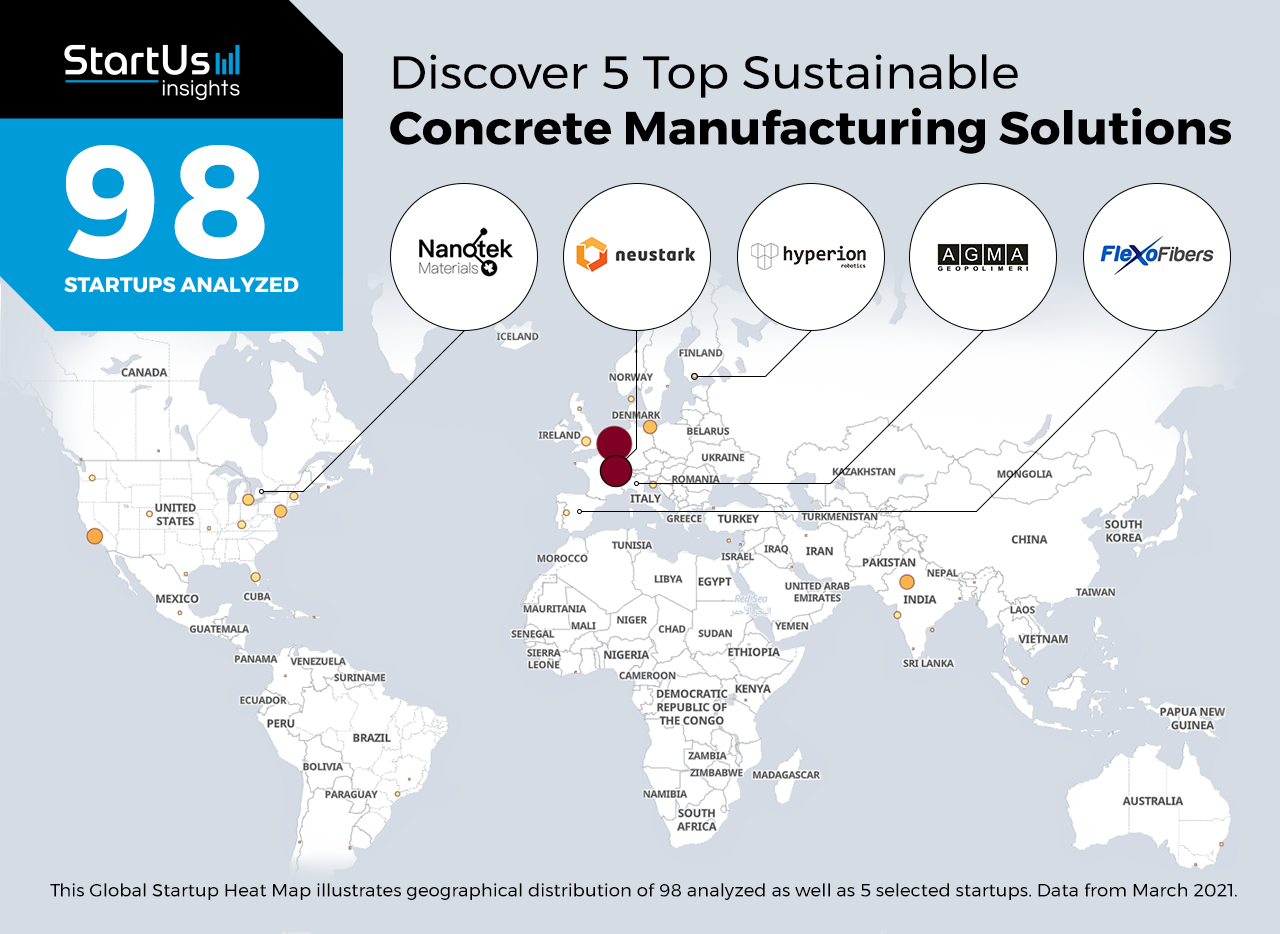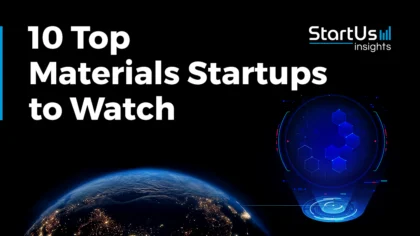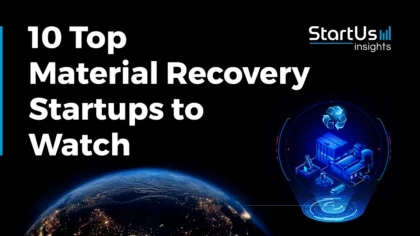Staying ahead of the technology curve means strengthening your competitive advantage. That is why we give you data-driven innovation insights into the manufacturing industry. This time, you get to discover 5 hand-picked startups developing sustainable concrete manufacturing solutions.
Global Startup Heat Map highlights 5 Top Concrete Manufacturing Solutions out of 98
The insights of this data-driven analysis are derived from the Big Data & Artificial Intelligence-powered StartUs Insights Discovery Platform, covering 1.379.000+ startups & scaleups globally. The platform gives you an exhaustive overview of emerging technologies & relevant startups within a specific field in just a few clicks.
The Global Startup Heat Map below reveals the distribution of the 98 exemplary startups & scaleups we analyzed for this research. Further, it highlights 5 manufacturing startups that we hand-picked based on criteria such as founding year, location, funding raised, and more. You get to explore the solutions of these 5 startups & scaleups in this report. For insights on the other 93 sustainable concrete manufacturing solutions, get in touch.
Nanotek Materials offers Nanocement
Cement production causes some of the largest greenhouse gas (GHG) emissions in the world. To address this, there is a push for smart and sustainable construction materials, as well as alternative processes for cement manufacturing. Startups are leveraging nanotechnology advances to develop a sustainable substitute for cementitious materials. Nanocement offers improvements in physical and mechanical performance and lowers the carbon impact of the industry.
Canadian startup Nanotek Materials develops nanocement. The startup’s process combines Portland cement with a superplasticizer-based nanoshell. It also includes nano-additives that provide higher density and strength with lower porosity. By replacing a large portion of the clinker with quartz sand, industrial waste, and ash, the startup’s solution lowers greenhouse emissions by up to 65%.
FLEXOFibers creates Steel Fiber for Concrete Reinforcement
The addition of steel fibers to cement materials makes concrete stronger and more durable. It provides the same flexibility with thinner slabs and makes construction simpler. However, steel production is polluting and the waste of concrete translates into a waste of steel fibers. This is why startups are working on concrete reinforcement solutions that utilize recycled steel.
Spanish startup FLEXOFibers produces steel fibers from recovered metal. The startup’s 100% recycled metal fiber uses high-quality steel wires of small diameter. FLEXOFiber Micro has a large number of filaments per unit of weight and provides better distribution throughout the concrete mass. The startup’s concrete reinforcer provides the same benefits as synthetic fibers.
AGMA Geopolymers develops Geopolymer
Cement manufacturing is an energy-intensive process. This is why construction startups are looking for more efficient manufacturing processes and low-carbon sources. Geopolymers utilize industrial waste and other waste streams, diverting them away from landfills. Hence geopolymers offer a low-carbon alternative to cement as well as provide better thermal insulation.
AGMA Geopolymers is an Italian startup developing ecologically sustainable solutions for construction. It converts industrial waste into a geopolymer, thereby reducing raw material costs. The startup’s production process includes mixing aluminosilicate powers with alkaline inactivators followed by reaction with a basic aqueous solution. The startup’s product also reduces energy costs in the production of cementitious materials, as well as lowers carbon dioxide (CO2) emissions.
Hyperion Robotics provides Robotic 3D Printing
The construction industry generates a large amount of waste and already adopts 3D printing technology to address this challenge. For instance, 3D printing allows manufacturers to shorten their supply chains and reduce material waste. It also enables the development of readymade panels and slabs for modular construction, thereby further facilitating sustainability.
Hyperion Robotics is a Finnish startup that uses robotic 3D printing to make construction sustainable. The startup’s end-to-end solution includes an extruder head, a robotic arm, and a mixer-pump. Along with the startup’s software solution, it prototypes and prints reinforced concrete elements. It uses structural optimization to maximize printing height while minimizing material use. This is how Hyperion Robotics’ solutions enable the production of green concrete.
neustark enables Atmospheric Carbon Capture
Cement production contributes to a large part of the anthropogenic carbon dioxide in the atmosphere. Carbon-capture technologies that redirect this carbon into cement manufacturing lower the overall carbon footprint of the industry. This is why startups and companies alike are developing innovative solutions that trap atmospheric carbon in concrete where it can stay for a long time.
Swiss startup neustark removes carbon dioxide from the atmosphere and stores it in recycled concrete. It applies the principles of natural mineralization, accelerating it to capture carbon more efficiently. It also optimizes concrete usage to minimize cement usage in concrete manufacturing. The startup’s concrete meets all standard quality criteria of workability, compressive strength, modulus of elasticity, and durability.
Discover more Manufacturing Startups
Manufacturing startups such as the examples highlighted in this report focus on innovative materials, robotics, automation as well as additive manufacturing. While all of these technologies play a major role in advancing the industry, they only represent the tip of the iceberg. To explore more manufacturing technologies, simply get in touch to let us look into your areas of interest. For a more general overview, you can download our free Manufacturing Innovation Report to save your time and improve strategic decision-making.









